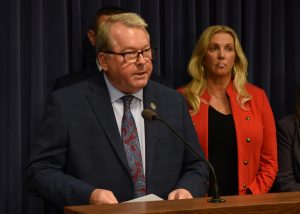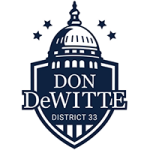 Illinois Senate Republicans are once again pushing for tougher ethics reforms that will hold politicians more accountable and better equip officials to investigate public corruption. On Jan. 27, they outlined several much-needed and long-overdue reforms to help restore Illinoisans’ faith in their state government.
Illinois Senate Republicans are once again pushing for tougher ethics reforms that will hold politicians more accountable and better equip officials to investigate public corruption. On Jan. 27, they outlined several much-needed and long-overdue reforms to help restore Illinoisans’ faith in their state government.
“Year after year, study after study, Illinois continues to rank as one of the most corrupt states in the country by outlets such as Forbes, FiveThirtyEight, and the Washington Post. According to Forbes, Illinois has experienced the second-highest number of federal public corruption convictions per capita,” said State Senator Jil Tracy, Chair of the Legislative Ethics Committee. “We must open the blinds in the smoke-filled back rooms, shine more light on politically-motivated activities, and make it easier for prosecutors to go after the bad actors who are out there.”
During the press conference, the Republican senators announced Senate Bill 3636, which they say will help ensure that lawmakers are looking out for their constituents rather than special interests, and give prosecutors and the Attorney General enhanced tools to effectively investigate and prosecute public officials who break the law.
“Our constituents expect us to be held to high ethical standards. They must know that we are adhering to the spirit of the law so that they can be confident that their representatives are representing them, not special interests,” said State Senator Terri Bryant (R-Murphysboro) “To regain the trust of the people of our state, we must close the loopholes that lawmakers have used and abused over the years.”
“Our legislation will finally implement the real change that Illinoisians want. Our constituents are tired of waiting,” said State Senator Sally Turner (R-Beason). “We must act now. It is time for legislators who have promised to combat corruption to keep their word.”
“General Assembly members are charged with representing Illinoisans, NOT serving their own personal interests,” said State Senator Sue Rezin (R-Morris). “State lawmakers must be held to higher standards of ethical behavior. With these reforms, we are working to hold them accountable and, in the process, restore some of the public trust that has been so terribly abused in recent years by politicians who have not served in good faith.”
Senate Bill 3636:
- Prohibits a General Assembly member, their spouse, or any immediate family member from lobbying as long as the individual is a member of the General Assembly.
- Prohibits a legislator during their term of office from negotiating employment with a lobbying firm (such as a job after their term of office), if that firm lobbies the General Assembly.
- Strengthens the revolving door for General Assembly members to prohibit them from lobbying for 12 months after leaving office (currently 6 months).
- Limits a lobbyist’s political activity so that anyone who is a lobbyist cannot be an officer for a candidate’s political committee or be a candidate supported by a political action committee.
- Expands the authority of a statewide grand jury to investigate and indict offenses involving the corruption of a public official, to include theft, fraud, extortion, or a violation of the official misconduct and public contracts articles of the criminal code of 2012.
- Expands Illinois’ R.I.C.O. law to include bribery, official misconduct, solicitation of misconduct, and legislative misconduct.
The announcement of Senate Bill 3636 comes on the heels of the resignation of former Legislative Inspector General, Carol Pope. Currently, that position remains vacant after Democrat members of the Legislative Ethics Commission have failed to accept the recommended candidate brought forward by an independent search committee.
“Democrats want to hand-pick their own watchdog. That is not OK,” said State Senator Don DeWitte (R-St. Charles). “It has been three weeks without a Legislative Inspector General, leaving legislators policing themselves. That is the complete opposite of how we gain back the public’s trust.”
On January 6, following Pope’s resignation, Senate Republicans announced Senate Bill 3030, which would give the Legislative Inspector General more power to investigate potential corruption.
Neither Senate Bill 3030 nor Senate Bill 3636 have been released from the Senate’s Assignments Committee.

